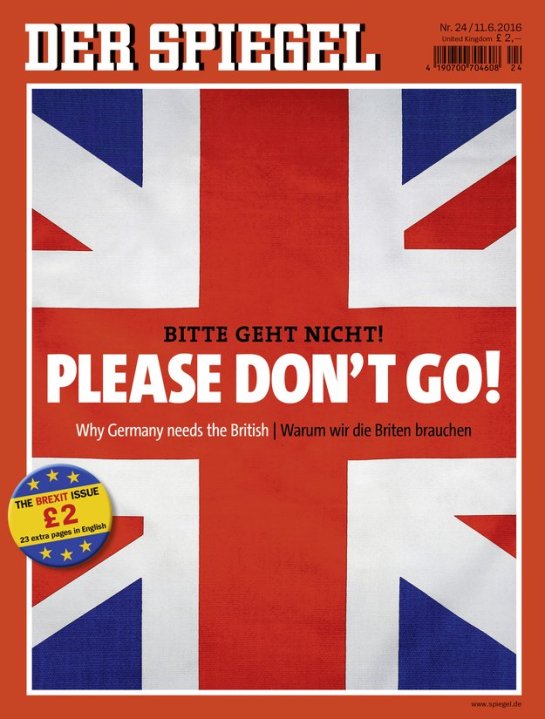A week after Angela Merkel intervened in the Brexit debate to say she hopes Britain stays in the EU, Germany’s Spiegel magazine has also waded in. The magazine’s headline is certainly emotive: ‘Please don’t go’, it urges, in an issue which includes several pages in English in a bid to reach out to Brits.
As with the clear-cut message on the front cover, the magazine’s poll on whether Germans want Britain to stay in the EU is also conclusive. Spiegel’s survey, conducted by TNS, showed that 79 per cent of people in Germany thought Britain should remain in the EU. It’s possible that this attitude derives from the popularity of the EU in Germany (in the same poll, just 13 per cent of Germans wanted their own country to walk away from the EU). But it’s obvious, too, that the magazine is attempting to convey an affection and a genuine will for Britain to remain in the EU. As the magazine’s editor explains, ‘The reason is an objective but also strong, emotional – and bilingual – appeal to the country: Please don’t go!’.
In the same issue, Germany’s finance minister Wolfgang Schauble also echoed Merkel’s plea about wanting Britain to stay in the EU. He says ‘the withdrawal of Britain would be a heavy loss for Europe’. Whilst the message here couldn’t be clearer, it’s less obvious whether it will actually work. Angela Merkel was apparently reluctant to intervene in the Brexit debate initially, out of a concern whether it could prove counterproductive. In his Spiegel interview, Schauble touches on a similar point. Asked whether ‘German support is not welcome in Britain’, he answers:
‘I also, of course, asked myself whether it is helpful for German politicians to be telling British voters what to do. I put the same question to my British counterpart, George Osborne, who had asked me to talk about the issue in London. He allayed my fears, and so I explained to the British public why I believe that it is better for the EU and Britain if voters decide against Brexit.’
Whilst Spiegel’s message might be born out of good intentions, whether it proves to be helpful remains to be seen.
NB. The Spectator actually ran a similar cover during the Scottish referendum:









Comments